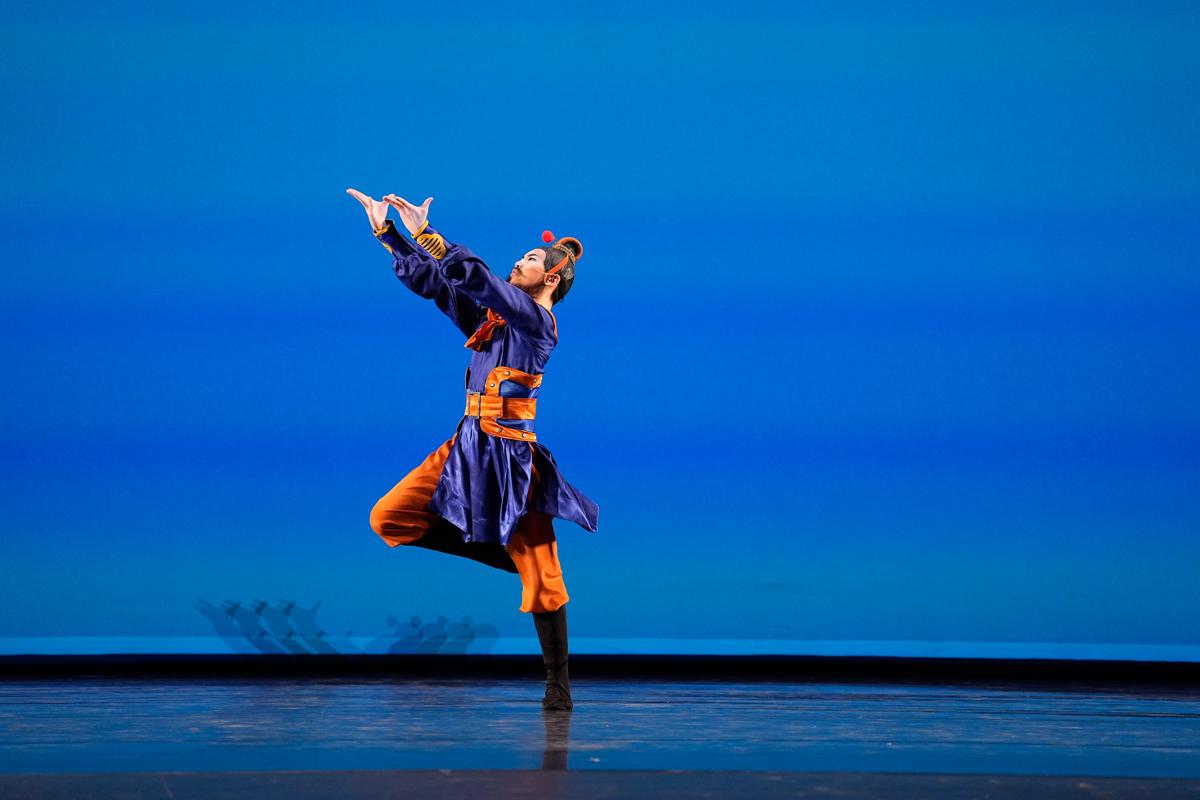When Ryan Zhou participated in his first dance competition in 2021, he said he was still a rookie, most concerned about his dance fundamentals. Now in 2023 and his second time participating in the NTD International Classical Chinese Dance Competition, Ryan has won Bronze.
“In the past two years, I’ve grown a lot, in technique and dance, and most importantly, artistry,” he shared. “Classical Chinese dance is not just about who jumps or flips the highest; technical skill needs to encompass inner meaning too. The most important thing isn’t just getting the moves right but the feeling that drives the movement needs to be there too.”
In the process of preparing for the competition, Ryan further deepened his artistry and understanding of traditional Chinese culture.
Ryan performed “Siege of Gaixia,” based on a famous battle in Chinese history. The warlord Xiang Yu rebelled against the Qin Dynasty and won the title of Hegemon-King. But when he set his sights on the Han Dynasty, headed by Liu Bang, he met his eventual defeat.
“Actually, at the beginning I did not want to choose this piece because I didn’t understand the character. I didn’t know the character at all,” he said. But his teacher had recommended it to him, and taking the advice, he gave it a try only to find that the character demanded him to do exactly what was most difficult.
“This character is really hard to portray because he’s so powerful, but it’s all on the inside,” Ryan said, describing his own energy as scattered and extroverted, and lacking that inner tension.
Yet, inner feeling is one of the most important things in classical Chinese dance, he explained. It’s an art form that uses feeling to drive movement, to convey stories, characters, and ideas.
“Through this dance, through the process of learning it, learning this character, learning the meaning of the story, learning his setbacks, his lessons, you grow as a person as well,” he said.
Facing Your Fate
Xiang Yu was an all powerful character, Ryan explained. But in the end, he still could not take the throne he coveted.“This character, Xiang Yu, he is so powerful and capable that he alone could take down over 100 enemies,” he said. “He’s incredibly capable but his personality is distrustful and he won’t cooperate with others ... All his subordinates, all his people, he didn’t trust them because he thought they would sabotage him.”
“But there’s also the question of fate,” Ryan said. “Because even though he was so incredible and could do so much, he couldn’t become emperor because the heavens wouldn’t allow it, and he realizes it in the end.”
Perhaps Xiang Yu’s fate had been set in stone and his ambitions were wrongly placed, or perhaps God would not allow him to advance his goal because of his moral shortcomings. Ryan said that even if we cannot know, there was much to be learned from his story.
“He thought he was all powerful and looked down on others ... he achieves everything through his own might, he doesn’t rely on anyone’s help, he doesn’t work with others, there’s no sense of team, of community. He wants to scale this peak himself, and at the end, he can’t go any higher,” Ryan said. “I think from this story, you learn about selfishness and learn to be more broadminded. If you don’t achieve your ultimate goal, the thing you want to achieve, maybe there’s something you need to let go of first.”
Ryan said he’s felt God’s hand on the arrangements in his own life, especially in his dance career.
 Ryan Zhou performs “Siege of Gaixia” in the preliminary round of the NTD International Classical Chinese Dance Competition in Purchase, N.Y., on Sept. 7, 2023. (Larry Dye)
Ryan Zhou performs “Siege of Gaixia” in the preliminary round of the NTD International Classical Chinese Dance Competition in Purchase, N.Y., on Sept. 7, 2023. (Larry Dye)“As I started doing it, I felt like, God is helping us with everything,” he said. “Classical Chinese dance is part of this divinely inspired culture, traditional Chinese culture. It was a gift from the heavens.”
“Classical Chinese dance is an art of pure beauty and authenticity, it’s upright, and makes the audience feel brighter and lighter. Being a divinely inspired culture, God is behind it,” he added.
Dancers like him study not just dance but also history and culture in order to be able to bring the audience something meaningful.
“I think if people can experience traditional culture, they'll discover how beautiful it is,” he said.
“This is my mission to do this,” Ryan added. “I feel another part is we’re conveying divinely inspired culture. If our heart is in the right place, if our compassion is there, then God will help us convey that compassion to the audience.”








